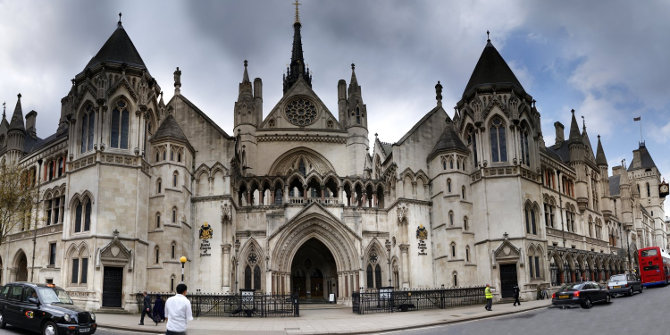Contrary to the aims of the Political Declaration, the UK government has refused to agree to co-operation between the UK and EU Parliaments. Davor Jancic (Queen Mary University of London) says this is not just misguided and antagonistic, but breaks with a tradition of inter-parliamentary co-operation that long predates the EU.
One of the surprising outcomes of the third round of UK-EU negotiations on a future relationship is the UK’s refusal to agree to post-Brexit inter-parliamentary cooperation. This can be explained in terms of sovereignty, diplomacy and the rule of law. But the government’s approach reflects an authority-asserting ethos, and is as flawed as it is troubling.

Here is why. First, if the intention is to shield new-found sovereignty against EU influence in an infelicitous crusade to take back control, that is unconvincing. It flouts the objectives agreed in both versions of the Political Declaration, which encourages the establishment of a dialogue between the UK Parliament and the European Parliament (EP) enabling them to share views and expertise where they see fit. It also goes against the preferences of these parliaments. In a resolution adopted in February 2020, the EP called for the setting up of a joint parliamentary body whose job would be to monitor the implementation of the future relationship agreement.
The value of parliamentary diplomacy after Brexit has been recognised in Westminster on multiple occasions too. In March 2019, for instance, the House of Lords argued in favour of establishing a UK-EU Joint Parliamentary Committee even before the conclusion of negotiations. From a broader perspective, these proposals follow the pattern of most international parliamentary institutions that currently operate around the world at both bilateral and multilateral levels. As one recent study shows, with few exceptions, they serve as deliberative forums rather than decision-making arenas. Any Euro-British parliamentary body would only have a consultative role. It would not have the power to adopt legally binding acts or be subject to the jurisdiction of the Court of Justice of the European Union.
Second, if the rejection of inter-parliamentary institutionalisation is merely a negotiating tactic within a wider diplomatic strategy, this, although conceivable, is also unpersuasive. This is not a contentious area of future UK-EU governance and certainly not one where antagonism is helpful. Instead of demonstrating good will, an unnecessarily adversarial approach risks further chipping away whatever trust remains between the two sides.
Not only is this a poor decision at a crucial time, it is one that sends the wrong signal to Britain’s partners abroad. The unwillingness to formalise a legislative dialogue with one of the world’s most influential polities and one with which the UK’s legal system is so highly intertwined, conflicts with the logic of a Global Britain eager to rekindle global connections. What should Singapore, Canada or Japan think of the British commitment to internationalism and democracy if the expansion of lawmakers’ networks is not welcomed?
Even worse, brushing legislators’ transnational role aside is, inadvertently, quite un-British because it collides with Westminster’s long-standing but little known tradition of openness to global governance. In fact, the ‘first father’ who initiated the founding back in 1889 of the oldest international parliamentary institution in the world, the Inter-Parliamentary Union (IPU), was a British Labour MP and Nobel Peace Prize laureate, William Randal Cremer. Both Houses of Parliament have since then actively and fruitfully engaged within the IPU. It is this spirit of good neighbourliness and good global citizenship that should be a model for post-Brexit UK. If the government’s view is that parliamentarians can always talk informally, this is unsatisfactory because institutionalised forms of cooperation provide structure, regularity, visibility and a sense of trust-building, which uncoordinated ad hoc contacts do not.
Third, the government is unwilling to share the foreign affairs powers it enjoys under the royal prerogative, even when it comes to benevolent but otherwise democratically beneficial inter-parliamentary collaboration. The UK’s official approach to future relationship negotiations deceptively evokes a sense of constitutional togetherness where it states that international relations remain ‘the responsibility of the UK Government and the UK Parliament’. Yet the logic of clear separation between Whitehall’s and Westminster’s spheres of influence is inherent in Brexit-related legislation. Encouraged by his landslide victory in the 2019 general election, Boris Johnson repealed the MPs’ rights under the European Union (Withdrawal) Act 2018 which would have empowered them to approve the framework for the future UK-EU relationship. Similarly, had the initial European Union (Withdrawal Agreement) Bill succeeded, MPs would also have gained the right to approve the objectives for the future relationship. On the contrary, the government now has a largely free hand to negotiate with the EU. Apart from parliamentary debates during the transition period, Westminster remains within the confines of the negative resolution process, which originates from a nearly 100-year old Ponsonby rule, now codified in the Constitutional Reform and Governance Act 2010.
This may be a discomfortingly literal exercise of the constitutional principle requiring the government to command rather than earn the support of the majority in the House of Commons, but Brexit is not only a crisis. It represents an opportunity to rethink Parliament’s rights of participation in international affairs, including treaty-making and parliamentary diplomacy. These developments are concerning in light of the rule of law because they hamper participation, transparency and oversight. Given the magnitude of Brexit’s economic and constitutional consequences for the UK, this is democratically unsound.
Finally, the standoffish attitude ignores the many benefits of formal inter-parliamentary relations. In Brexit negotiations, the EP has risen to the status of a ‘quasi-negotiator’ owing to its resolutions and impact-oriented institutional structures such as its steering group and Brexit coordinator. Beyond this, the EP has become an important veto player in EU foreign relations, one that all major global powers, such as the US and China, try to build stronger ties with. This is not just for reasons of friendship and socialisation. Transnational legislative forums and networks are invaluable sources of information and act as vehicles for policy debates and norm promotion. As such, they can have positive effects. The dialogues they generate enrich domestic political discussions and can help to prevent frictions, reduce tensions and iron out misunderstandings.
Significantly, this would ensure that after Brexit the voice of the people, acting through their elected representatives, is heard in Brussels. This would in turn give the UK a periodic insight into EU affairs as well as a degree of indirect influence. This can then better equip MPs and peers for the exercise of democratic control back in the Palace of Westminster. For a political party whose previous government was found in contempt of parliament, more transparency – not less – should be a priority, and legislative dialogues foster this. All of these reasons demonstrate why the Prime Minister should change course and embrace formal parliamentary liaison as a vital component of the future UK-EU relations.
This post represents the views of the author and not those of the Brexit blog, nor LSE.







You have based the entire article on this false premise:
“One of the surprising outcomes of the third round of UK-EU negotiations on a future relationship is the UK’s refusal to agree to post-Brexit inter-parliamentary cooperation.”
The truth is that the EU is demanding that a sovereign, non-member state comply with EU law and jurisdiction.
The UK government is rightly stating that such events will not occur.Can you imagine New Zealand demanding that Chile accept NZ laws and jurisdiction?
The concept is too ridiculous to consider, and all this does is expose yet again the anger that the EU feels at losing a valued (financially, at any rate) member state.
You stated:
“…the House of Lords argued in favour of establishing a UK-EU Joint Parliamentary Committee…”
The HOL has never accepted the democratic result of the 2016 Referendum, and has fought the passage of the required legislation at every opportunity.
The irony of an unelected Chamber being supportive of an unelected EU appears lost on many Remoaners.
“the voice of the people, acting through their elected representatives”…The voices of the people spent three years trying to ignore the voice of the people.
The UK has left the EU. If the EU wishes to have a good relationship with the UK, then we will listen to what they have to say, if it is mutually beneficial then the UK will consider it, if it is not, then we will not entertain it.
End of story. The EU is going to have find a new cash cow.
This is a very interesting article and reminds us of the outstanding contribution made by William Randal Cremer who did so much to promote reconciliation between the United States and Britain to settle their differences by arbitration. This led to an Inter-Parliamentary Union being formed and this influenced The Hague Peace Conference of 1899. There was and is an obvious reason why such inter-parliamentary discourse is invaluable expressed quite pointedly by President Grover Cleveland of the United States in honouring the initiative of Mr Cremer and the British House of Commons: ‘Without arbitration, diplomacy. If that fails, war and sacrifice of life, and retrogression in civilization.’
It is neither in the tradition or character of the House of Commons or Britain therefore to turn its back on friendly open discussion between representatives of our closest neighbours who uphold the same values of the rule of law and international law norms. We may not be in the EU, but we are, along with the United States, a member of NATO and have a vested interest in maintaining a constructive relationship with our EU allies: Brexit or no Brexit.
A rational, interesting and sane article. I would disagree only in the unspoken assumption that the UK government is moderate, logical and rational. I suppose that articles like this have to make that assumption to forestall accusations of emotion and bias.
But in reality the present extreme right-wing UK government is collectively as mad as a bag of spanners and as rational as Madame Blavatsky. There should therefore really be no expectation that any course they follow will be any different.
I found this section most disturbing:
“Not only is this a poor decision at a crucial time, it is one that sends the wrong signal to Britain’s partners abroad. The unwillingness to formalise a legislative dialogue with one of the world’s most influential polities and one with which the UK’s legal system is so highly intertwined, conflicts with the logic of a Global Britain eager to rekindle global connections. What should Singapore, Canada or Japan think of the British commitment to internationalism and democracy if the expansion of lawmakers’ networks is not welcomed?”
Canada and Japan do not have a ‘legislative dialogue’, so why would either of them expect the UK and the EU to have one?
The concept of expanding lawmakers’ networks occurs when a nation is conquering others by force, or when the EU accepts another member state. It is not something that is performed by sovereign nations.
The UK’s legal system bears no resemblance to that of the EU, and will function perfectly well in the future without EU interference.. It is true that certain EU statutes will remain, but once they are replaced, that will end the matter. How and when they are replaced will be a matter for the UK government of the day.
There is zero requirement for a legislative dialogue to be formalised. The diplomatic channels that were open prior to 1973 still exist
Well, a lawyer’s argument. Boris must, for once, have made the right decision. It is an incontrovertible fact that the referendum result, though conclusive, did not stop the losing side contesting the implementation of it very vigorously indeed. Both the EU and its supporters within the EU, the UK and, indeed, the world over and the UK governments and MPs and Lords have, since the referendum, never ceased from trying to overturn the result, water Brexit down to Brino and some even supporting a campaign for another referendum. Hence, there are good reasons why Boris did not agree to this project.
There is need for the setting of priorities in the business of government. Just now, not least because the EU has shown itself consistently obstructive in the matter of Brexit, there is need for a clean break. Even before the referendum its apparatchiks were not prepared to give the UK electorate a fair go. Since the referendum there has been nothing but bad faith on the part of the EU Commission, and the EP has not been helpful in putting the negotiations between the UK and the EU Commission on an even and fair basis. The time for some form of body in which the EP and the HoL may officially hold a talking shop is decidedly not now. Besides, who wants it, why, to whose benefit and who is going to pay for it? The answer is clear, though not acknowledged. The EP is a rubber stamp parliament. It seeks greater leverage in order to be more of a pretend parliament than it is now. In principle, there is nothing wrong with that. The EP has been set up for a purpose. The EU as a body, as an organisation, has a long history, going back in the shades of behind-the-scenes European power politics, of planning for a federation of European vassal states. There is no way the European Parliament so called is going to be allowed any real powers any time soon, no, not in a year of Sundays it ain’t. So, naturally, MEPs are looking for some useful and, indeed, for them meaningful activity. That is most admirable. Except for EU ‘foreign policy’ posturing, they are at a loss as to what to do, either within or without their official remit. Let’s face it. It is a parliament in name only.
Lastly, for now; under the circumstances, is anyone, other than diehard Remainers, going to pretend that this inter-parliamentary set-up is going to do anything other than stymie Brexit and UK sovereignty in any way whatsoever?